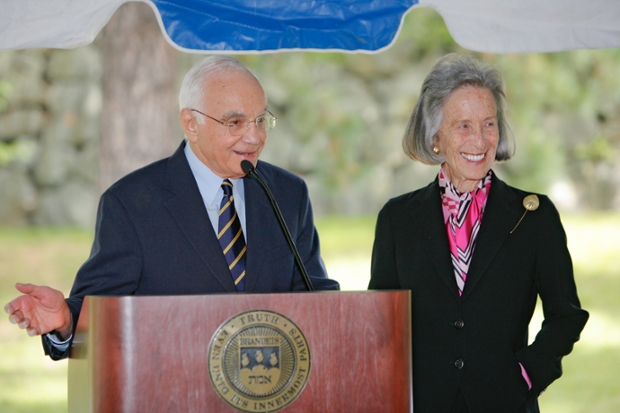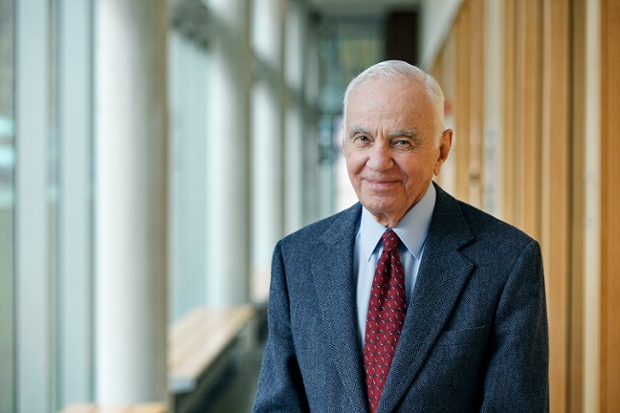Morton L. Mandel, P’73, H’89, philanthropist who gave to causes worldwide, dies at 98
Morton Mandel, P’73, H’89, who was one of Brandeis University’s greatest benefactors, died on Oct. 16 at the age of 98.
His was a rags-to-riches tale crowned by remarkable generosity.
Born in 1921 in Cleveland, Ohio to Jewish immigrants who fled pogroms in their native Poland, Mr. Mandel and two brothers in 1940 scraped together $900 for an auto parts business they built over the decades into a $3-billion multinational electronics corporation.
Philanthropy was a constant over Mr. Mandel’s career. He and his older brothers, Jack and Joseph, made their first gift to Brandeis in 1953, only five years after the university’s founding, and the same year they established a charitable foundation in their family’s name.
Since then, the Jack, Joseph and Morton Mandel Foundation has donated an estimated $1 billion worldwide to higher education, the arts and humanities, among other causes. More than half a billion dollars of that has been invested in Israel. Some $45 million has been given to Brandeis, where his wife, Barbara, P’73, H’19, is a longtime trustee, and daughter Amy ’73 is an alumna.
The foundation’s largest gift to Brandeis, $22.5 million, created the Mandel Center for the Humanities in 2010. Other gifts have established the Jack, Joseph and Morton Mandel Center for Studies in Jewish Education, endowed faculty chairs, and supported graduate fellowships.
“Mort Mandel was an extraordinary man,” said Brandeis President Ron Liebowitz. “His legacy of transformational commitment to Brandeis, to the Jewish people, to Israel, to the arts and humanities, to health and medicine, and to leadership excellence, will be felt around the world for years to come. We at Brandeis feel blessed to have known Mort. May his memory be a blessing to all who were and will continue to be touched by his life’s work.”
Mr. Mandel earned an academic scholarship to Case Western Reserve University in Cleveland but dropped out after a year to go in on the car-parts business with his brothers. The company they built, Premier Industrial Corp., was one of the world’s largest electronic components suppliers when it merged with Farnell Electronics in 1996 in a $3-billion deal.
When Mr. Mandel was young, his immigrant parents operated a dry goods shop in Cleveland until his father was bedridden with multiple sclerosis, leaving his mother, Rose, to provide for the family by selling clothing out of suitcases on city streets.
“We were poor,” he told Brandeis Magazine. “We had a place to live, we were never hungry, but I can’t remember my mother buying me a toy. We did, though, have a very rich life because of her.”
He credited his mother with teaching his family the “joy and obligation of helping others.” His family had little during the Depression, but his mother would give a sandwich to a hungry man who showed up at the door, or a few dollars to a neighbor to buy a dress for a child.
Mr. Mandel’s first earnings came from selling hot dogs and peanuts at the Cleveland ballpark, and he recalled vividly bringing home $1.50. “What it must have done for me to give that money to my mother,” he told Brandeis Magazine.
Giving was his watchword thereafter.
At Brandeis alone, the Mandel Foundation has established the Jack, Joseph and Morton Mandel Center for Studies in Jewish Education, and created three faculty chairs: the Jack, Joseph and Morton Mandel Professorship in Jewish Education; the Jack, Joseph and Morton Mandel Professorship in Jewish Education Research; and the Jack, Joseph and Morton Mandel Professorship in Jewish Educational Thought. Students are supported through the Barbara and Morton Mandel Graduate Fellowships in the Humanities, and the Barbara and Morton Mandel Graduate Fellowships in English and American Literature.

Morton and Barbara Mandel at the groundbreaking for the Mandel Center for the Humanities in 2008
Jehuda Reinharz, now president of the Mandel Foundation, experienced that generosity first-hand as Brandeis’ president from 1994 to 2010. “I never actually asked Mort for money,” he recalled in Brandeis Magazine. “We talked about ideas. His investment in the university arose from those discussions.” He said Mr. Mandel always began a dinner conversation by asking the same questions: “What idea would really make a difference? What would transform Brandeis and the world around it?”
As director of the Jack, Joseph and Morton Mandel Center for Studies in Jewish Education at Brandeis, Jon Levisohn met regularly with Mr. Mandel up until the past few years.
“He had a passion for projects that would improve the world, capture the imagination of children and adults, and deepen the noblest commitments of individuals and communities,” said Levisohn, who holds the Jack, Joseph and Morton Mandel Associate Professorship in Jewish Educational Thought at Brandeis.
"He asked tough but fair questions,” Levisohn said. “He proposed new ideas. He reminded us to invest in people, as he had always done. And most importantly, he always emphasized his belief in our potential to make a positive and lasting impact."
Ramie Targoff, professor of English, co-chair of Italian studies, and Jehuda Reinharz Director of the Mandel Center for the Humanities at Brandeis, said: “Mort Mandel’s commitment to what the humanities could do for our students, our faculty, our community, and our country at large, drove his extraordinary generosity. His gift of the Mandel Humanities Center has brought so many positive changes to our campus, too many to enumerate here, but we will strive to keep his intellectual curiosity and his human decency at the heart of what we do. He will be sorely, sorely missed.”
The Mandel Foundation has given generously to causes in Cleveland and to Israeli and Jewish institutions. Besides Brandeis, the many organizations that have benefited from the Mandels’ support over the years include Hebrew University, Bezalel Academy of Arts and Design, and the Israel Museum, all in Jerusalem; the U.S. Holocaust Memorial Museum in Washington, D.C.; the Cooper Hewitt Smithsonian Design Museum in Manhattan; and Case Western Reserve, to which he returned to receive his bachelor’s degree in 2013 at age 92.
He received his 12th honorary doctorate, from Tel Aviv University, in September 2019.
Mr. Mandel was selected in August 2019 as a recipient of the Carnegie Medal of Philanthropy, which recognizes those who have “committed their wealth to the benefit of mankind.”
In his 2012 book, “It's All About Who You Hire, How They Lead...and Other Essential Advice from a Self-Made Leader,” Mr. Mandel wrote: “The world can be a dark and chaotic place. My life’s goal is to light as many candles as possible to brighten the prospects of the less fortunate in this world.”
He leaves his wife, Barbara, daughters Amy Mandel ’73 and Stacy (Keith) Palagye and son Thomas (Lisa) Mandel; grandchildren Alicia Mandel, Daniela Mandel, Wilson Petricig, Jack Petricig, Daniel Mandel, Sherilyn (Phil) Ciccarelli, Lilian Rose Palagye, Olivia Lyn Palagye; and great-granddaughters Amora Mandel Carson and Chloe Ciccarelli.
Categories: Alumni, General, Humanities and Social Sciences, Research, Student Life






